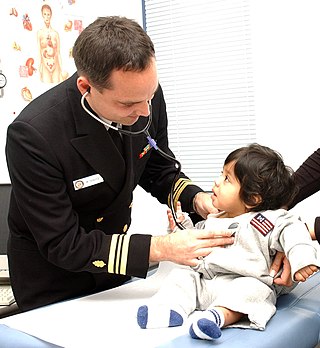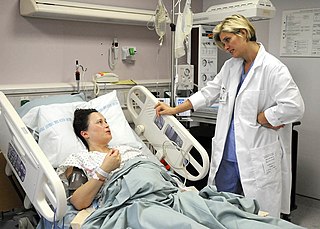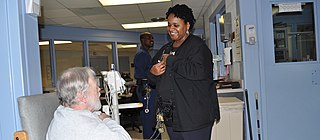
A paramedic is a healthcare professional trained in the medical model, whose main role has historically been to respond to emergency calls for medical help outside of a hospital. Paramedics work as part of the emergency medical services (EMS), most often in ambulances. They also have roles in emergency medicine, primary care, transfer medicine and remote/offshore medicine. The scope of practice of a paramedic varies between countries, but generally includes autonomous decision making around the emergency care of patients.

Ambulatory care or outpatient care is medical care provided on an outpatient basis, including diagnosis, observation, consultation, treatment, intervention, and rehabilitation services. This care can include advanced medical technology and procedures even when provided outside of hospitals.

Intramuscular injection, often abbreviated IM, is the injection of a substance into a muscle. In medicine, it is one of several methods for parenteral administration of medications. Intramuscular injection may be preferred because muscles have larger and more numerous blood vessels than subcutaneous tissue, leading to faster absorption than subcutaneous or intradermal injections. Medication administered via intramuscular injection is not subject to the first-pass metabolism effect which affects oral medications.

Geriatrics, or geriatric medicine, is a medical specialty focused on providing care for the unique health needs of the elderly. The term geriatrics originates from the Greek γέρων geron meaning "old man", and ιατρός iatros meaning "healer". It aims to promote health by preventing, diagnosing and treating disease in older adults. There is no defined age at which patients may be under the care of a geriatrician, or geriatric physician, a physician who specializes in the care of older people. Rather, this decision is guided by individual patient need and the caregiving structures available to them. This care may benefit those who are managing multiple chronic conditions or experiencing significant age-related complications that threaten quality of daily life. Geriatric care may be indicated if caregiving responsibilities become increasingly stressful or medically complex for family and caregivers to manage independently.

Travel medicine or emporiatrics is the branch of medicine that deals with the prevention and management of health problems of international travelers.

A nurse practitioner (NP) is an advanced practice registered nurse and a type of mid-level practitioner. NPs are trained to assess patient needs, order and interpret diagnostic and laboratory tests, diagnose disease, prescribe medications and formulate treatment plans. NP training covers basic disease prevention, coordination of care, and health promotion.
A health professional, healthcare professional, or healthcare worker is a provider of health care treatment and advice based on formal training and experience. The field includes those who work as a nurse, physician, physician assistant, registered dietitian, veterinarian, veterinary technician, optometrist, pharmacist, pharmacy technician, medical assistant, physical therapist, occupational therapist, dentist, midwife, psychologist, audiologist, or healthcare scientist, or who perform services in allied health professions. Experts in public health and community health are also health professionals.
Health is the state of complete physical, mental, and social well-being and a positive concept emphasizing social and personal resources, as well as physical capacities. This article lists major topics related to personal health.
A registered psychiatric nurse (RPN) specialises in a field of nursing that focuses on the mental health of patients. Psychiatric nurses assist the interdisciplinary team in the assessment and treatment of the patient's psychiatric illness and symptoms. They treat a variety of mental health disorders such as bipolar, depression, schizophrenia, anxiety, substance abuse addiction and eating disorders such as bulimia and anorexia. However, they do not diagnose the patient, this is the responsibility of a qualified psychologist or a psychiatric doctor. Psychiatric nurses are in charge of dispensing medication and the overall care of patients. Registered psychiatric nurses work under the supervision of doctors’ and they practice within the health care industry, mostly in mental health clinics, outpatient facilities, mental health agencies, long-term care centres or hospitals.
Travel clinics are medical facilities that specialize in the practice of travel medicine. The field primarily focuses on providing preventive medical care, such as administering vaccinations against tropical diseases such as yellow fever and typhoid fever as well as prescribing medications to prevent malaria. Travel clinic patients, or clients as they are sometimes known, are largely international travelers embarking on trips abroad for purposes related to leisure, business, adoption and visiting friends and family.

Nursing is a health care profession that "integrates the art and science of caring and focuses on the protection, promotion, and optimization of health and human functioning; prevention of illness and injury; facilitation of healing; and alleviation of suffering through compassionate presence". Nurses practice in many specialties with varying levels of certification and responsibility. Nurses comprise the largest component of most healthcare environments. Shortages of qualified nurses are found in many countries.

In health care facilities, isolation represents one of several measures that can be taken to implement in infection control: the prevention of communicable diseases from being transmitted from a patient to other patients, health care workers, and visitors, or from outsiders to a particular patient. Various forms of isolation exist, in some of which contact procedures are modified, and others in which the patient is kept away from all other people. In a system devised, and periodically revised, by the U.S. Centers for Disease Control and Prevention (CDC), various levels of patient isolation comprise application of one or more formally described "precaution".
NmVac4-A/C/Y/W-135 is the commercial name of the polysaccharide vaccine against the bacterium that causes meningococcal meningitis. The product, by JN-International Medical Corporation, is designed and formulated to be used in developing countries for protecting populations during meningitis disease epidemics.

Yellow fever vaccine is a vaccine that protects against yellow fever. Yellow fever is a viral infection that occurs in Africa and South America. Most people begin to develop immunity within ten days of vaccination and 99% are protected within one month, and this appears to be lifelong. The vaccine can be used to control outbreaks of disease. It is given either by injection into a muscle or just under the skin.
Kent Holtorf is an American physician and entrepreneur practicing in Los Angeles, California. He is a board examiner of the American Board of Anti-Aging Medicine (ABAAM), which is not recognized by established medical organizations. He is the founder and medical director of Holtorf Medical Group, a practice with five centers that offer treatment for conditions including fibromyalgia, adrenal fatigue, complex endocrine dysfunction, hypothyroidism, age management, chronic fatigue syndrome, low libido, chronic Lyme disease, migraines, PMS, perimenopause and menopause. His practice focuses on alternative therapies that are not recognised as effective. He has been criticized in the media for his controversial views on topics like bioidentical hormone replacement therapy and vaccines.
Occupational health nursing is a specialty nursing practice that provides for and delivers health and safety programs and services to workers, worker populations, and community groups. The practice focuses on promotion, maintenance and restoration of health, prevention of illness and injury, and protection from work‐related and environmental hazards. Occupational health nurses (OHNs) aim to combine knowledge of health and business to balance safe and healthful work environments and a "healthy" bottom line.
A mental health nurse (MHN) refers to a nurse in the UK, who specializes in the care of patients with mental health issues. The practice of MHNs is called mental health nursing.

A nurse midwife is both a nurse and a midwife, having completed nursing and midwifery education leading to practice as a nurse midwife and sometimes credentialed in the specialty. Nurse midwives provide care of women across the lifespan, including during pregnancy and the postpartum period, and well woman care and birth control.

Correctional nursing or forensic nursing is nursing as it relates to prisoners. Nurses are required in prisons, jails, and detention centers; their job is to provide physical and mental healthcare for detainees and inmates. In these correctional settings, nurses are the primary healthcare providers. These nurses also work with crime victims and assist in expert witness testimonies, and are involved in a variety of legal cases, including paternity disputes and workplace injuries.
The Standing Committee on Vaccination at the Robert Koch Institute, or STIKO, is a scientific committee comprising 18 members at the Robert Koch Institute in Berlin, Germany that provides official recommendations for the vaccination schedules used by the individual German states. The committee meets twice yearly to review the latest research regarding vaccination against infectious diseases. Although the STIKO makes recommendations, immunization in Germany is voluntary and there are no official government recommendations. German Federal States typically follow the STIKO's recommendations minimally, although each state can make recommendations for their geographic jurisdiction that extends beyond the recommended list. In addition to the proposed immunization schedule for children and adults, the STIKO recommends vaccinations for occupational groups, police, travelers, and other at risk groups.










